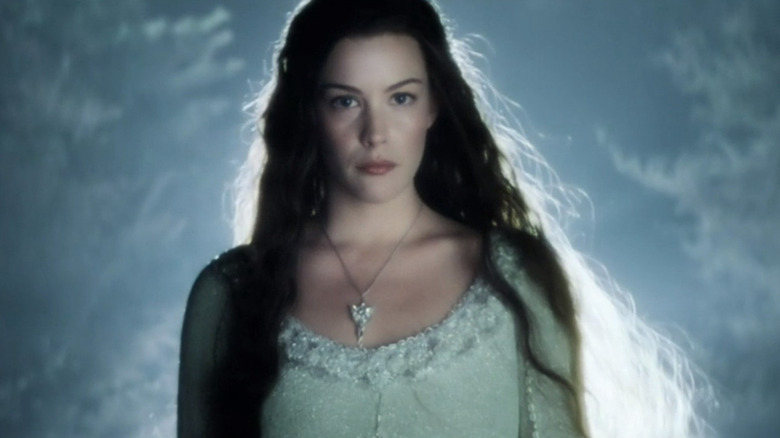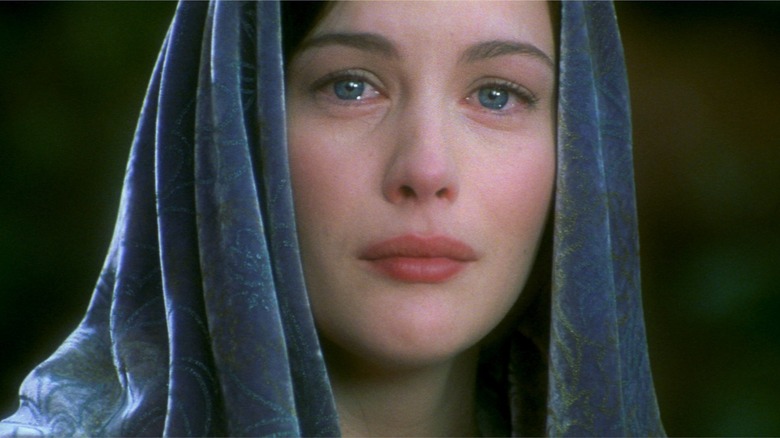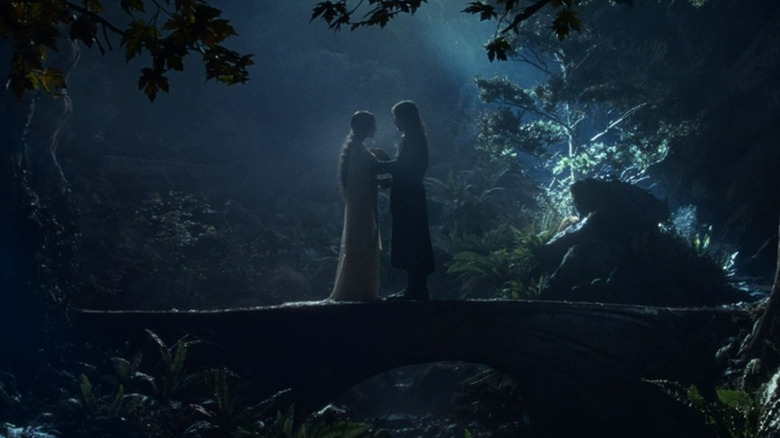Arwen Was Central To Fellowship Of The Ring (Despite Few Mentions In The Book)
There's a poetic irony to the reverence which Peter Jackson's "The Lord of the Rings" trilogy holds amongst movie junkies and bookworms alike. Please don't misunderstand, the films unquestionably earned their place in the hallowed halls of cinematic history. The theatrical editions, as well as the extended cuts, are well worth their weight in mithril. That said, Jackson committed the exact same "sin" while fashioning the War of the Ring as he did while retelling Bilbo's inaugural adventure: He played fast and loose with the source material.
"The Lord of the Rings" is a book in six parts; each volume contains two parts and J. R. R. Tolkien considers each part to be a fraction of one greater whole. It features so much more content than could ever be crammed into nine hours of film. Tom Bombadil, a forest-dwelling enigma in yellow boots, is entirely missing. So is the sacking of the Shire, where Frodo Baggins (Elijah Wood) and his fellow Hobbits discover they picked up a thing or two on their journey, like the ability to helm siege warfare.
Alongside these notable cuts, there was one major addition -– the presence of Arwen (Liv Tyler), daughter to Elrond (Hugo Weaving), the half-elf Lord of Rivendell. In Tolkien's work, her journey wasn't given focus until an appendix following the conclusion of the sixth part but in Jackson's trilogy, she's engaged with the core narrative from almost the beginning.
Arwen, a woman of action
In "The Fellowship of the Ring," Arwen is introduced to audiences while Frodo (Elijah Wood) is suffering from a cursed stab wound, courtesy of the Witch-king of Angmar. She arrives to find Aragorn (Viggo Mortensen), her star-crossed boyfriend, tending to Frodo's ailment as best he can. But it's not enough. If something doesn't change — and soon — the Hobbit would die. So Arwen spirits him away to Rivendell on her steed. Without the others to slow them down, the pair move swiftly.
But there's a problem. The ringwraiths, nine human husks at the beck and call of Lord Sauron, are close behind, desperate to catch and kill little Frodo. Arwen, who is having absolutely none of their shenanigans, summons the raging power of a river to wash away the cloaked creatures like so much useless driftwood. It's an awesome visual display of power and cements her as a figure to be feared and respected, and it's totally fabricated for the movie.
As J. R. R. Tolkien wrote, it's not Arwen who takes Frodo to Rivendell, but rather an elfin man named Glorfindel. When the ringwraiths catch up, he literally jumps ship so that the horse can bare Frodo even more quickly. As for controlling the waters to attempt mass murder, that bit belongs to Elrond. Arwen takes no part in it or any other battle, and she definitely doesn't get to nudge her father into allying the elves alongside Aragorn's plight of kingship. She's barely even mentioned outside of the appendix that chronicles her love story with Aragorn.
When change begets respect
Arwen's relationship with Aragorn, the rightful heir to the throne of Gondor, is pivotal to the latter's narrative arc. She's literally his guiding light. Aragon fights for her as much as he fights for the betterment of the realm, and it is to her that his fate is bound. Jackson correctly understood that audiences needed that information post haste and made the necessary adjustments. In doing so, he excised a character who's literally never seen again the "The Lord of the Rings" (sorry, Glorfindel) and gave Arwen an additional shot of agency. In his interpretation, it's little wonder that a man of action like Aragorn would find himself drawn to a woman of equal footing.
Yes, her active presence is a deviation from J. R. R. Tolkien's original writings, but his work is also based wholly on the respective perspectives of the four Hobbits in the Fellowship, and that little conceit was scrapped, too. Again, please don't misunderstand. Tolkien's work is still held in high regard for good reason. It's that books play by different rules than movies, and are permitted to spend time telling, rather than showing. If audiences only saw Arwen at the end of the third film as some post-credit reward for Aragorn's sacrifices, it would have been nine hours too late for anyone to care, and that wouldn't have been fair to her or to the story she represents. Sometimes, honoring the source material demands changing it.


